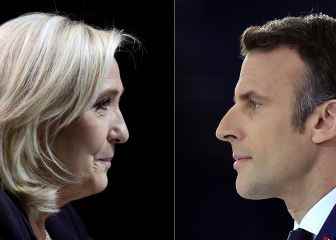The current French president has resisted the extreme right after receiving 28.4% of the votes in the first round of the presidential election, according to Ipsos/Sopra Steria vote estimates at 9:00 p.m. Marine Le Pen, far-right leader of the National Rally, has registered 23.4% of the votes and he will face Macron on April 24 in the second and definitive elections that will decide the next president of France.
With this result, which is still under scrutiny, Macron exceeds the vote registered in 2017 (24%) and improves the forecasts that estimated only a difference of two or three points between their match La République En Marche! and National Group. For its part, Le Pen also increases the vote of the previous presidential elections (21.3%) but he is five points away from the French president.
the left party France Unsuspecting, led by Jean-Luc Mélenchon, stays two points behind to participate in the second round after collecting the 21.1% of the votes and increase five tenths its result of 2017. The extreme right of Éric Zemmour is running as the fourth force with the 7%followed by The Republicans by Valérie Pecresse (4.7%), Yannick Jadot’s The Greens (4.5%), Resist by Jean Lassalle (3.2%), the Communist party of Fabien Roussell (2.4%), France at Pie de Dupont-Aignan (2.1%), the socialists of Anne Hidalgo (1.8%), Philippe Poutou’s Anti-Capitalists (0.8%) and Workers’ Struggle by Nathalie Arthaud (0.6%).
These results are not definitive, they come from the projection of IPSOS FRANCE at 9:00 p.m.
Young people lead the abstention
The results confirm the bump of the Socialists and Republicans. The votes of both barely reach 7%, and it is estimated that to recover the cost of electoral campaigns it is necessary to register at least 5% of the votes. Another surprise has been abstention: Ipsos places it at 26.5% and Ifop at 25%, thus rising between three and four points compared to the 2017 elections (22.2%) and approaching the historical record of 2002 (28.4%). According to a survey carried out by Le Parisianthe reasons for the abstention would be the scarcity of new proposals and candidates who are not up to the task or who do not represent the voters.
According to the French medium, lThe highest rate of abstention has been recorded in young people between 18 and 24 years old (42% vote abstention) and those between 25 and 34 years old (46%). The twenty% of people between the ages of 50 and 59 have abstained, a figure that decreases as 12% in the age range of 60 to 69 years and at 23% in people older than 70 years. By professions, workers were the most abstentionist and retirees were the ones who most turned out to vote.
France repeats the electoral final five years ago between Macron and Le Pen. To remember an event like this you have to look back, until 1981when Socialist François Mitterand beat then-president Valéry Giscard D’Estaign seven years after losing to him.
What supports would each have?
As the results appear, the leaders of the formations that have been left out of the second round express their party’s intention to vote for the final. Mélenchon, the third French force with more than 20% of the vote, has asked that Le Pen be avoided: “We know who we will never vote for. Don’t give a single voice to Madame Le Pen“He explained on his Twitter profile.
With him agrees the anti-capitalist Philippe Poutou, who has stated that “no vote should go to the extreme right”, although he did not want to give a vote slogan either. Anne Hidalgo (Socialists) has urged to vote for Macron and Valérie Pécresse (Republicans) also has confirmed his vote for the current French president. the environmentalist Yannick Jadot He has also asked for the vote for La République En Marche! in the second round. Fabien Roussel, candidate of the communist party, has appealed to his voters to “beat Marine LePen“In the second round.
On the other hand, the far-right Éric Zemmour, who has garnered 7% of the vote, has expressed his support for Le Pen for the final on April 24.
